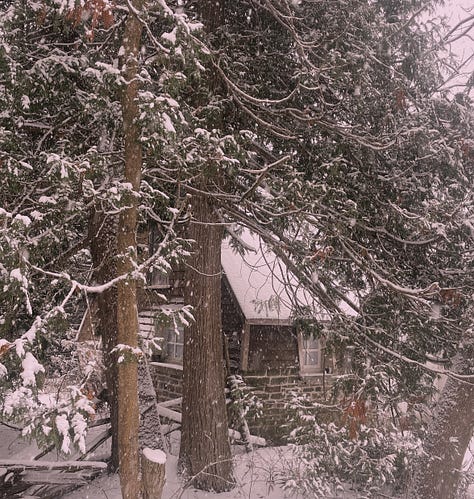Once upon a time, an old man, after a long and full life, passed away.
Only moments after watching the tunnel of light gradually darken and close, he found himself in a small and well-lit cavern. Before him, ten feet tall, loomed a silent shadowy figure. Face veiled by a low-hanging hood and cloaked in billowing white robes, whipping furiously like a flag in a windstorm, steaming with a silvery pale mist.
In the small and well-lit cavern, there were two doors, sturdy and made of dark oak. One on his right side and one on his left.
"Do I get to choose?" he asked, looking up at the shadowy figure, a hot pressure building behind his ears.
His heavenly host stayed silent.
Suddenly the heavy door on his left swung open with a creak that hit a crescendo with a crash. Full of fear and trembling, knees buckling beneath his frail frame, the old man stepped through. But, before him was a feast for sore eyes.
A long hall stretched out, at least a hundred feet, with a roaring fire in the hearth at the far end and mounted torches beaming bright in wrought-iron sconces, casting warm shadows around the room. Vaulted ceilings arched high overhead with finely woven tapestries covering every inch of the strong stone walls. Every ten feet was a shimmering sculpture. Athena molded in marble and Hercules gilded out of gold and Odysseus in burnished bronze. Plaster vases with a well-worn patina stood elegantly on slim shelves, brimming with freshly cut carnations and lilacs, hyacinths and lavender.
It was a room that would have made the Kings of Babylon blush.
Then, the old man's eyes finally arrived at the middle of the great hall. A bustling banquet table, garnished with glistening hors d’oeuvre, honey-glazed hams crowded against platters of potato gratin and pecan pie, cornish hens bewitched to a dark gold1. Around the table, tucked into their seats was a throng of people, of all ages, nations, and creeds. Licking their chops. Salaciously salivating. Ready to dig in.
"I must be in heaven!" the old man exclaimed, excitedly, overjoyed that God had seen the good in him at last. But, immediately and instinctively, he whipped his head around to the shadowy figure, with hopeful eyebrows, feeling like a little boy, begging for his father's approval.
The crackling fire filled the silent seconds.
The old man's excitement began to twist into an intense, sickening despair.
All of a sudden, in a great flurry of movement, the men and women around the banquet table, picked up their forks and knives. They piled huge portions from every platter on their polished plates and raised fierce forkfuls to their wide, hungry, gaping mouths. But, as their arm reached full extension, a mere four feet from their face, forks hanging tremulously in the balance, their limbs locked straight as if they'd been gripped in a steel vice.
Wrists began wiggling and writhing, food flying everywhere, furiously trying to get forks to faces. People started sweating, gnashing teeth, convulsing, eyes turning rabid and crazed.
But it was hopeless. There they would remain. Bellies empty. Struggling to eat. For eternity.
The old man's heart crashed through his stomach, sending sea-sick waves of nausea back up through his throat.
"No... This must be hell," he muttered, distraught beyond words.
"Take me away, please take me away," weeping, with a fresh burst of energy, falling and grasping for his host's knees.
Silence.
But, with the reality-bending rules of dreams, the old man looked again and he was back in the cavern. The dark oak door on his right swung open.
His life seeming more infinitely precious than ever, the old man went through the second door.
He stood and looked. Then, he stood and looked more, until tears creased the corners of his wrinkled eyes.
The room was identical.
Thinking it was all a mean trick, the old man tried an undiplomatic dash for the door, but found his two feet frozen in place. The shadowy figure, robes still blowing and bellowing as if the very fabric was alive, stirred a slow circle with an outstretched index finger, beckoning the man to turn around and watch.
Just as before, a throng of people, same in number, crowded around the banquet table. Just as before, they raised forkfuls of food. And just as before, their arms were locked straight and stiff.
But, after a few seconds of struggling, failing to feed themselves, each and every guest at the table paused, turned to their right, swinging their outstretched arm like a construction crane, and did something miraculous.
They fed their neighbor.
Until all around the table were full.
The old man's gawk melted into a toothy grin.
"Huh..."
"This must be heaven."
~~~
I've been thinking about this tale as of late, as I sink into the certainty of my utter dependence on other human beings. I have been fed, helped, taught, guided, and healed by so many humans. It's almost unbearable.
Recently, I read a 2,000-word essay on finding meaning in a modern life that feels meaningless that basically said: find work you love and spend more time helping your local community. In other words, be of service.
Service is not a devotion to feeling better, but being better. Not better thoughts, but better actions. It’s being devoted to generosity, not just because it feels good, but because it is good.
This is hard. It is painful at times. But it's better than the alternative: being devoted to my own happiness which, strangely, makes me miserable and isolated within myself. Maybe the difficulty, the pain, the unwillingness to sacrifice but doing it anyway, is what makes it valuable. Maybe that makes it mean something. Maybe life expands in proportion to our capacity to do hard things.
This is especially hard because we live in an era that incessantly nudges us to put our own needs first, to avoid commitment, to follow our wishes and whims, to protect all our time for ourselves, to detach from anything and everything that places demands on us, to complain to a therapist about loved ones instead of praying for them. The world does revolve around us2. At least, that's what we're told.
But I think this is the reason modern people are starving for meaning and, despite their addiction to TED talks, their perfected mudras or their polished mantras, it cannot be found. Maybe mustered for a day, before it passes away. Meaning, purpose, fulfillment, worthiness, whatever you want to call it, is simply not found solely within the self. It is not within, but without.
I find it hard to justify my existence as an isolated entity. I find it easier when I can point to all the big and little ways I can serve other people. Be useful. Lighten the burden of another. And by caring about others more than myself, by turning outwards and asking how I can serve the world instead of how the world can serve me, it elevates me. Paradoxically, by sacrificing and sublimating my self in the service of others, I end up feeling better.
Meaning, perhaps, is to be found in relation. In the conversation between ourselves and the other.
It's a complete paradox, I know. It goes against all our intuitions of what should make us happy. But, from my empirical experience, it's true.
I think learning to truly care about other people, showing up even when it's hard, and sacrificing for them in a large number of little, difficult, unsexy ways, day in and day out, is where real freedom is found3. Whereas the modern cult of individuality and independence, not being bound to anything, able to "leave at any time," seems more like a strange form of slavery4.
It's not easy nor encouraged to see through the fog. To resist the undertow. The convincing tug of a narrative that insists we are the most important thing in the world. That we should live to gratify all our desires. That pursuing our happiness is even the path to happiness5.
What's missing, what's been forgotten, is responsibility. Demands on the self. A sense of obligation to something bigger. Something outside of our own skull-sized kingdom. Duty to others is a weight, but it's a weight we seem to desperately need6.
I don't want to manifest more abundance for myself. I don't want to meditate until I "pop" into the bliss of Nirvana and leave my loved ones in the dust. I don't want my life to be about my happiness. I don't even want my life to be about me. I don't want to matter that much. Which is good. Because I don't. It's a relief to realize there are far more important things than the self.
No matter how untethered my soul could become, I don't think I could call my life a real success if my joy wasn't wedded to responsibility. Duty. If I didn't take care of my family when they got sick or wasn't there for my friends when their car broke down. If I didn't make the real lives of those I interact with, better. If I wasn't charming and cheerful and engaged, wherever I go.
I cannot be above the people around me, on a pedestal of enlightened aloneness. I've never forgotten Montaigne's maxim that the surest sign of wisdom is constant cheerfulness.
To truly serve the people in your life, to be in relationship with them on the same muddy mucky playing field, is to pay attention to their tender intricacies and their tiny idiosyncrasies. Even develop a fondness for their flaws. It's instructing yourself to love, through embodied doing. I'm continually learning to make my heart bigger.
Because the more I can pry the seconds from my cold clutching fingers, crack the ghostly cage around my heart, and close the vast distance between us, through acts of service, the better my life gets.
Living this way is hard. Many days I don't do it. Many days I fall short. But when I do, it works. Humans love to sacrifice. We've forgotten that.
For a while, I've known it was true. This whole service thing. For a while, I've known that the men and women I admired most were devoted to serving others. But I'm beginning to believe it's capital-T True. That the goodness of our desperate world rests on the shoulders of those who dare to sacrifice themselves. Who pour themselves out, through love, for others. I think the foundation of existence itself is the spirit of loving sacrifice7. Without it, the world would crumble.
Here's the truth: Everybody worships something. Everybody serves someone. The only choice we get is what. But the irony is, the only way to truly live in this crazy world is to make sure it isn’t ourselves.
Or, we will salivate but starve.
Your faithful friend and servant,
If you feel my essays are meaningful to you and want me to continue to create this work, the best way to show support is by becoming a patron:
Or, if you are not ready to become a patron, you can Buy Me A Coffee (small, one-time donation). If you wish.
👋 what i’ve been up to:
I’ve been back home with family, enjoying the holiday spirit, connecting with friends, and getting involved in my community. Most days are small and boring, but I’m learning to take great joy in mundane things.
Last week, I shared 10 offline things I’ve been doing with patrons: cutting down a Christmas tree, visiting pretty towns, long winter hikes.
📸 photos i took:






Ontario in December.
Inspired by Fitzgerald’s depiction of Gatsby’s buffet table.
“The world doesn’t revolve around you, you know” is an old saying for a good reason.
As Nietzsche prophesied, we had to become gods ourselves simply to appear worthy of our murder of God. Alone at the center of all creation.
Paraphrasing a line from DFW’s This is Water, I think.
Don't get me wrong. There is every reason to retreat from the world. To tend to your own garden and give up on trying to mend such a broken, insane mess. But that's not the final stage. It can't be.
The ultimate act of optimism is to roll up your sleeves and wade back into the chaos, knowing how bad it is, but still trying to make things better. To serve the world not because it is broken, but because it is sacred. Because all it's been, and maybe ever will be, is a beautiful disaster.
The cold calculus of capitalism is fueled off this narrative. It's a story that works really well to promote the exchange of goods and services and create consumption and generate immense wealth. But really poorly in ways that are harder to talk about.
Responsibility is a gateway to meaning. It might be the gateway. Responding respond to the things you need to. The question becomes: What in my life do I need to respond to?
I can’t see how it can be any other way. It's what good parents do when they raise children. Children who revivify and restore the world and save our culture from collapse.





Great piece, Tommy. Your message today is something I need a cyclical reminder of. For some reason, the world we live in today, as you say, makes it far too tempting to fall into a self-centered routine. I think everyone, or a lot of people, live this way--are working so hard--with the hope that they may eventually be able to divorce themselves via monetary abundance from worldy pressures and "live for others." But it seems, almost always, that no matter how much money they make, they almost never transition wholly to living the life they originally intended . . . And I think that's because they forget "it is a fool who puts off what he'd like to do now in hopes he can do it later." That by working to get wealthy first, they are forming habits--as in, becoming--of a person who serves themselves first and others second. That's not to say we should all relinquish our worldly belongings, but that we should make a habit nnow, today, of serving others.
“being devoted to my own happiness which, strangely, makes me miserable and isolated within myself.”
Tommy, this brings to mind the subtle but important distinction of “being of service to ourselves” not in lieu of serving others, but so that we can serve others. Not so that our own happiness is the destination, or the goal - as you point out - it is a paradox that can lead to misery.
But we must also serve ourselves so that we can bring our fully nourished and expanded self to others.
For me, when the balance is out of whack, when I’m under-nourishing myself, I feel depleted at times. And when I’m over serving myself, something feels off - and I feel disconnected from Source.
I think the practice is awareness and continually maintaining an integrity between the external and internal focus of service through time.
This essay was an exquisite expression of that integrity - service to your readers, and I suspect, service to yourself as you wrote it. 👏